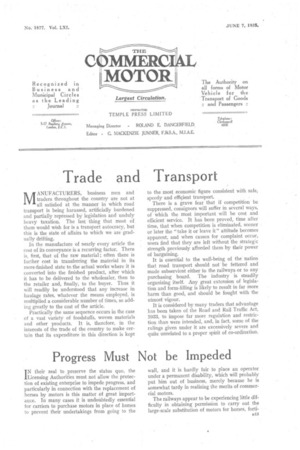Trade and Transport
Page 27

If you've noticed an error in this article please click here to report it so we can fix it.
ANTJFACTURERS, business men and traders throughout the country are not at all satisfied at the manner in which road transport is being harassed, artificially burdened and partially repressed by legislation and unduly heavy taxation. The last thing that most of them would wish for is a transport autocracy, but this is the state of affairs to which we are gradually drifting.
In the manufacture of nearly every article the cost of its conveyance is a recurring factor. There is, first, that of the raw material; often there is further cost in transferring the material in its more-finished state to the actual works where it is converted into the finished product, after which it has to be delivered to the wholesaler, then to the retailer and, finally, to the buyer. Thus it will readily be understood that any increase in haulage rates, whatever the means employed, is multiplied a considerable number of times, so adding greatly to the cost of the article.
Practically the same sequence occurs in the case of a vast variety of foodstuffs, woven materials and other products. it is, therefore, in the interests of the trade of the country to make certain that its expenditure in this direction is kept to the most economic figure consistent with safe, speedy and efficient transport.
There is a grave fear that if competition• be suppressed, consignors will suffer in several ways, of which the most important will be cost and efficient service. It has been proved, time after time, that when competition is eliminated, sooner or later the "take it or leave it" attitude becomes apparent, and when causes for complaint occur, users find that they are left without the strategic strength previously afforded them by their power of bargaining. It is essential to the well-being of the nation that road transport should not be fettered and made subservient either to the railways or to any purchasing board. The industry is steadily organizing itself. Any great extension of legislation and form-filling is likely to result in far more harm than good, and should be fought with the utmost vigour.
It is considered by many traders that advantage has been taken of the Road and Rail Traffic Act, 1933, to impose far more regulation and restriction than were intended, and, in fact, some of the rulings given under it are excessively severe and quite unrelated to a proper spirit of co-ordination.




























































































